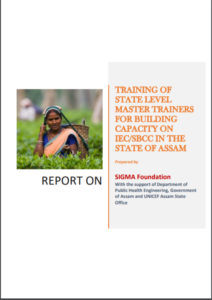Report on Training of State Level Master Trainers for Building Capacity on IEC/SBCC in the STATE of Assam
Contributed By: Dr. M. N. Roy, Dr. Debasri Mukherjee and Er. Sohini TarafdarConstruction of toilets for attaining universal access and declaring any village or administrative unit to be ODF is the first step, which has to be followed by use and maintenance of the facilities and adoption of sanitary behaviour by all to establish the same as a social norm. Further there was uneven prioritization to improving WASH in schools, health care facilities including in Anganwadi centres and Operation and Maintenance (O&M) of the WASH facilities in communities and in institutions with clear accountability and operating procedures. There is need to intensify communication with all the stakeholders for creating true ODF communities and its sustainability. The requirement is well understood at the policy level and various Information Education and Communication (IEC) and Social Behaviour Change Communication (SBCC) activities were conducted for generation of demand and behaviour change as per the annual action plan under the SBM(G). However, at the ground level the focus was mostly confined to construction of toilets, which was also driven generally by subsidy and not by demand to use toilet.
With large numbers of districts and Gram Panchayats (GPs) being declared as ODF, the challenge the state now faces is how to take up 2nd generation SBCC activities for adoption of sanitary behaviour, completely stopping open defecation and improving personal hygiene in private as well as public domain for reducing exposure to diseases as well as reducing for malnutrition due to poor environmental sanitation. The MDWS advised the states to engage Swachhgrahis at village level who are the foot soldiers of the Swachh Bharat Mission (Grameen) and the motivators for bringing about behaviour change with respect to key sanitation practices in rural India.
PHED Assam mobilized the Swachhgrahis in large number and they were supposed to carry out SBCC activities at the village level. Several problems have been faced in utilizing them efficiently. These are: (i) lack of context specific innovative approaches to social and behaviour change communication that are effective, efficient and scalable, (ii) lack of proper training of the Swachhgrahis to understand their responsibilities and developing required communication skill, (iii) there has not yet been any system of management of the Swachhgrahis and (iv) the system of monitoring of their activities has been weak. There is also significant equity issues and study in other states shows that the poorer sections have both less access to functional toilet and usage of the same. The approach towards making the state ODF (as well as the country) being top-down there has not been enough sensitization and mobilization of the community in the form of a social movement. The community needs to be sensitized and triggered to use toilets by carrying out SBCC activities at the village level. The problem is that though the state leadership is keen to take up SBCC activities intensely the state lacks capacity in organizing effective SBCC on WASH at the village level and the role of Swachhagrahis has become even more critical after the ODF declaration for its sustenance. PHED Assam wanted UNICEF Assam State Office to Strengthen HR capacity of the Government of Assam in SBCC trainings delivery. The purpose was to create a pool of SBCC WASH Master Trainers from 6 WASH focus districts of Assam namely Dhemaji, Tinsukia, Majuli, Goalpara, Dhuburi and Barpeta.
The approach was to create a pool of competent trainers in a cascading mode. 36 State Level Master Trainers (SMTs) were identified by PHED from 6 districts. They were mostly employees of the PHED or others as decided by the PHED. The SMTs were provided a residential training for 5 days at Don Bosco Institute of Management by the resource persons from SIGMA Foundation. A comprehensive technical manual comprising of all the detailed topics covered by the key resource persons throughout the training session were provided as training material to the trainees for their ready reference. A competency framework was developed which was used for the grading of master trainers. The sessions were conducted as per the TOT schedule

